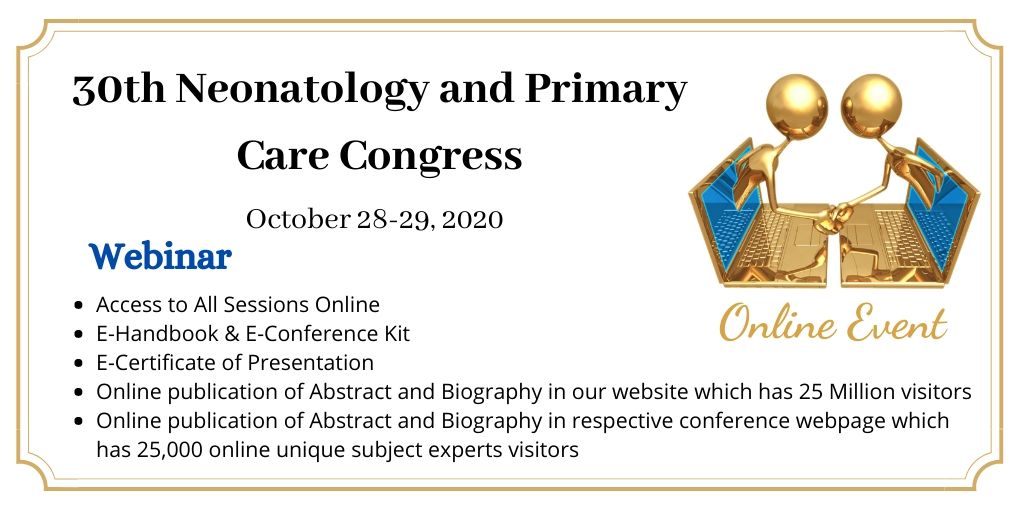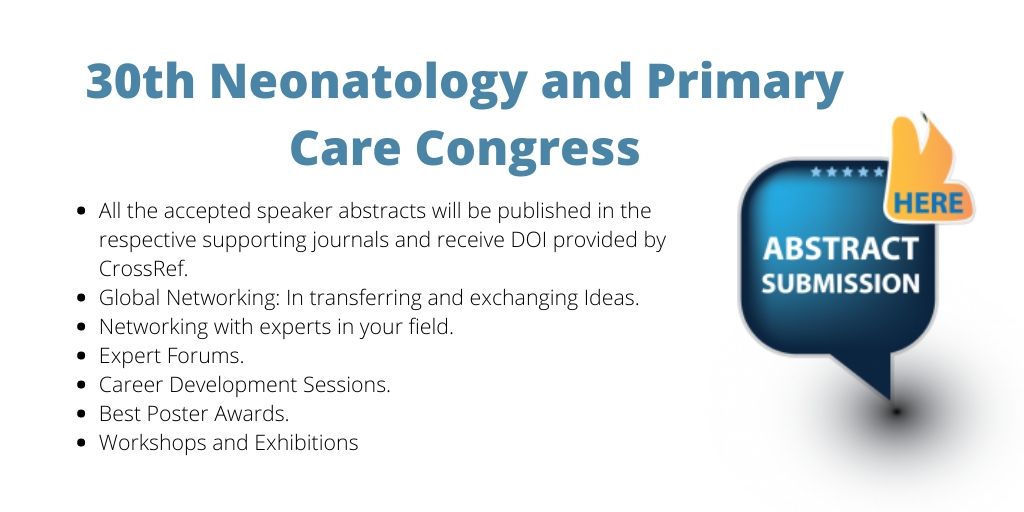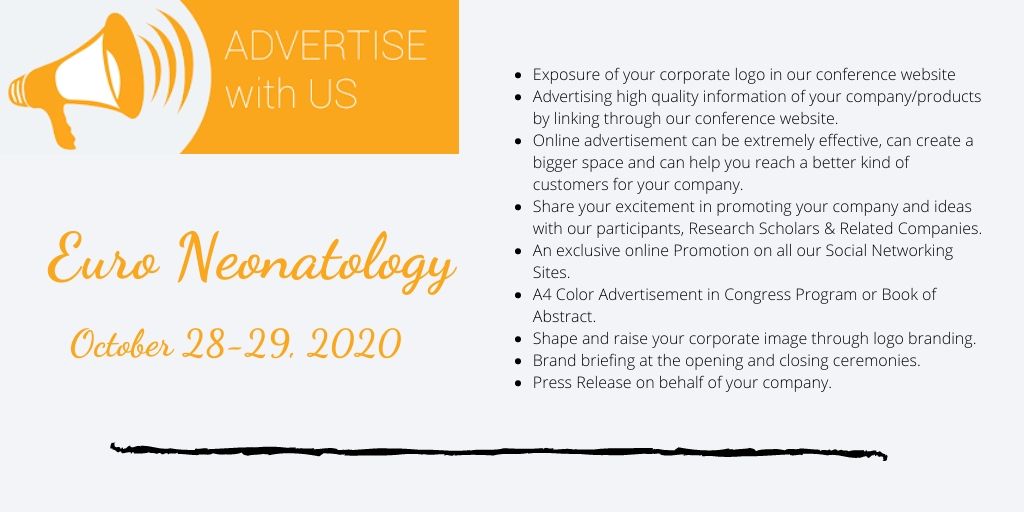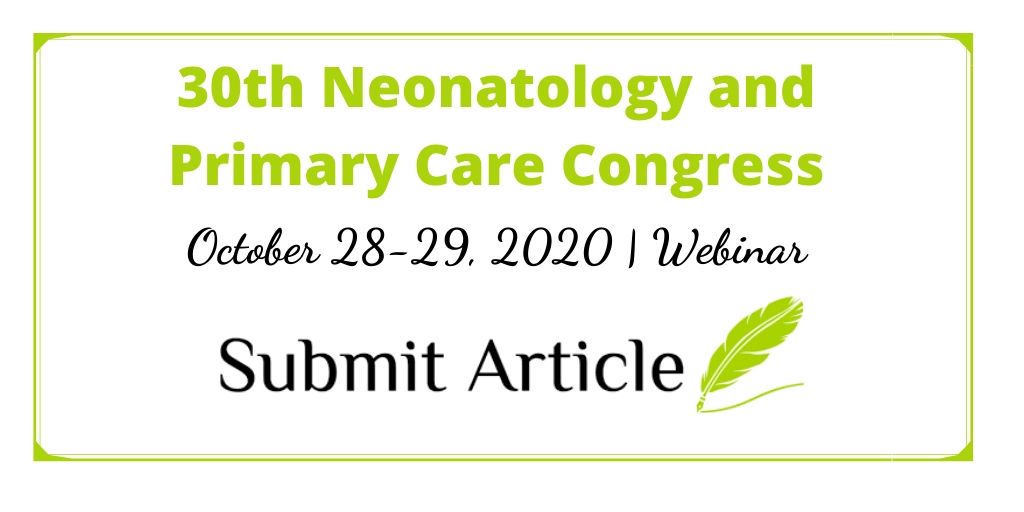Theme:
Euro Neonatology 2020
The “30th Neonatology and Primary Care Congress” under the theme: “Current Evolution and Advancements in Neonatology Care” during October 28-29, 2020 Webinar which is going to be organized by Conference series LLC Ltd. The organizing committee is preparing for an informative, exciting conference including lectures, symposia, workshop`s on a wide variety of topics through oral, poster presentations by the participants across the globe. We invite you to join us at EURO NEONATOLOGY 2020 where you will be sure to have a meaningful experience with scholars from around the world.
Our conference includes a well-balanced line up of speakers, covering both specific & broad topics of interest. Our main aim is to provide, specialists, neonatal physicians, technologists, nurses and anyone who is professionally involved in Neonatology with an opportunity to learn about the complexity of the disease, and to discuss interventional procedures, look at new and advanced Neonatal care and their efficiency and efficacy in the treatment of various cases, and understand local realities & practical constraints in improving patient-care at 30th Neonatology and Primary Care Congress.
We expect to share knowledge, learn from each other, and continue to enhance our understanding of these current hurdles in this field of medicine. The Conference on 30th Neonatology and Primary Care Congress invites all interested participants to join us for the webinar at october 28-29, 2020
Theme: Current Evolution and Advancements in Neonatology Care
Why to Attend?
- All the accepted speaker abstracts will be published in the respective supporting journals and receive DOI provided by CrossRef.
- Global Networking: In transferring and exchanging Ideas.
- Networking with experts in your field.
- Expert Forums.
- Career Development Sessions.
- Best Poster Awards.
- Workshops and Exhibitions
Key benefits of attending:
- Join interactive sessions including keynote speeches, session speeches and panel discussions to debate on future challenges and opportunities in the natural cosmetics market and skin care.
- Hear from international thought-leaders on new trends in sourcing natural raw materials, sustainable supply chains, and global regulatory frameworks.
- Discover best practices from natural and organic cosmetic ingredients manufacturers, brands, cosmetics distributors, and global authorized certification bodies.
- Increase your networking and business opportunities with senior leaders and decision makers in the beauty and cosmetics market.
Target Audience:
- Neonatology Researchers
- Neonatology Scientists
- Neonatology Physicians
- Neonatology Nurses
- Neonatology Associations and Societies
- Medical Colleges
- Neonatology Faculty
- Training Institutes
- Software developing companies
- Business Entrepreneurs
- Data Management Companies
- Manufacturing Medical Devices Companies
Neonatology is a field of pediatrics that comprise of the medical care of newborn infants, specifically the ill or premature newborn. It is a hospital-based area, and is commonly practiced in neonatal intensive care units (NICUs). The primary patients of neonatologists are newborn infants who need special medical care due to birth complications. They also act as common pediatricians, giving well newborn evaluation and care in the hospital. Diseases of concern during the neonatal period include:
- Neonatal Cancer
- Neonatal Sepsis
- Neonatal Stroke
- Neonatal Diabetes Millitus
- Neonatal Seizure
Perinatology is also known as Maternal-Fetal Medicine (MFM), is the division of medicine that emphasis on managing health concerns of mother and fetus before, after and during pregnancy. Maternal–fetal medicine specialists are physicians who subspecialize within the field of obstetrics and attend to patients who fall within certain levels of maternal care. They take care of pregnant women who have chronic conditions, pregnant women who are at risk for pregnancy-related complications and pregnant women with fetuses at risk.
- Prenatal Tests
- Preterm Labour
- Pre-eclampsia
- Congenital Abnormalities
Neonatal Intensive Care Units (NICU’s)
A neonatal intensive care unit (NICU) specializing in the care of ill or premature newborn infants. Neonatal period of the newborn babies are first 28 days of life. Neonatal care is known as specialized nurseries or intensive care. NICU also called as an intensive care nursery (ICN), is an intensive care unit (ICU). NICU is typically directed by one or more neonatologists and staffed by nurses, nurse practitioners, pharmacists, physician assistants, resident physicians, respiratory therapists, and dieticians. Many other ancillary disciplines and specialists are available at larger units. The Neonatal Intensive Care Unit (NICU) is a particularly challenging environment for new mothers as several natural processes are disrupted.
- Blood pressure monitor
- Ventilator Respirator
- Cardiopulmonary monitor
- Umbilical catheter
- C-PAP (continuous positive airway pressure)
- Nasal cannula or nasal prongs
Neonatal nursing is a kind of caring who were brought into the world untimely and debilitated babies. There were huge quantities of conditions that can influence new conceived babies and require medications from masters with multidisciplinary social insurance group. Untimely children have the issues as respiratory issues which are perilous, directed under authorities. Neonatal nursing bolsters the guardians also.
- Neonatal nursing abilities
- Very great relational abilities
- An sympathetic comprehension for the guardians and other relatives
- An enthusiasm for new-conceived babies
- A great comprehension of the physiological and mental needs of the new-conceived
- The ability to work in a profoundly specialized region
- The capacity to work viably inside a multi-disciplinary group.
Immunization's quick advantage is singular insusceptibility: It gives long haul, some of the time deep rooted assurance against an infection. The antibodies suggested in the youth inoculation plan shield youngsters from measles, chicken pox, pneumococcal infection, and different ailments. As kids become more established, extra immunizations shield them from illnesses that influence young people and grown-ups, just as for maladies they may experience during movement to different areas. Explorers to specific pieces of South America and Africa, for instance, are required to get the yellow fever immunization, as the illness is as yet predominant there. Inoculations, or immunizations as they're likewise known, securely and viably utilize a modest quantity of a debilitated or murdered infection or microbes or bits of lab-made protein that mirror the infection so as to forestall contamination by that equivalent infection or microscopic organisms.
At the point when you get an inoculation, you're infused with a debilitated type of (or a piece of) an infection. This triggers your body's invulnerable reaction, making it either produce antibodies to that specific sickness or incite different procedures that upgrade insusceptibility.
Significance of Vaccination:
- Parents need to do everything conceivable to ensure their kids are solid and shielded from preventable maladies.
- Vaccination is the most ideal approach to do that vaccination is sheltered and viable. All antibodies experience long and cautious audit by researchers, specialists, and the government to ensure they are sheltered.
- Outbreaks of preventable illnesses happen when numerous guardians choose not to inoculate their youngsters.
- Vaccination shields youngsters from genuine ailment and entanglements of antibody preventable ailments which can incorporate removal of an arm or leg, loss of motion of appendages, hearing misfortune, seizures, mind harm, and demise.
Congenital Malformations & Birth Complications
Birth defect is a widely used term for a congenital malformation, is a condition present at birth despite of its cause. Congenital malformation can be genetic, it can result from exposure of the fetus to a malforming agent (such as alcohol), or it can be of unknown origin. A physical defect present in a baby at birth that may cause many different parts of the body including the brain, heart, lungs, liver, bones, and intestinal tract. Congenital Disorders are divided in to two main categories: structural disorders in which problems are seen with the shape of a body part and functional disorder in which problems exist with how a body part works.
- Chromosomal Disorders
- Perineal tears
- Abnormal heart rate of the baby
- Perinatal asphyxia
The neonate born with a genetic defect or fetal anomaly presents a challenge to the neonatal intensive care unit team. Genetic disorders in the neonate should be suspected in a number of different clinical situations, ranging from that of an infant with dysmorphic features and multiple congenital malformations to that of a previously well newborn who becomes acutely ill. Typically genetic disorders are thought of as being rare; however, this is not true, and it is becoming increasingly evident as knowledge and technology progress. An evidence-based approach to the neonate who has a suspected genetic anomaly is essential to provide accurate diagnosis and to guide ongoing care.
- Neonatal Jaundice
- Genetic Screening
- Neonatal Diabetes
- Genetic Disorders
Sustenance is key to life. The acknowledgment that nourishment and development in fetal life and early stages stimuluses long haul wellbeing makes it especially significant that sustenance is streamlined at these beginning times. Preterm newborn children are tested by juvenile gut and metabolic capacity, and offsetting prerequisites with resilience requires point by point information and ability. Nourishment gives the vitality and supplements that children should be sound. For a child, bosom milk is ideal. It has all the fundamental nutrients and minerals. Baby equations are accessible for babies whose moms are not ready to or choose not to breastfeed.
New-born children are normally prepared to eat strong nourishments at around a half year old enough. Check with your medicinal services supplier for the best time for your infant to begin. In the event that you present each new nourishment in turn, you will have the option to recognize any nourishment that causes sensitivities in your child. Unfavourably susceptible responses incorporate a rash, the runs, or heaving. The focal point of research in sustenance of newborn children conceived at term is to a great extent coordinated at new recipe items that will improve psychological and metabolic results. Giving the best nourishment to preterm newborn children ought to be organized as a significant focal point of neonatal consideration research to improve long haul metabolic and formative results.
Neonatal neurology considered as a potential subspecialty of paediatric neurology. It has traditionally been led by neonatologists, both in the clinic and in research settings. The neurologist's role on a neonatal unit has mostly been limited to brief consultations for newborn infants that do not respond to firstâ€line therapies. Advances in the care of high-risk newborn babies have contributed to reduced mortality rates for premature and term births, but the surviving neonates constantly have increased neurological morbidity. The usually encountered neurologic diagnoses in the neonatal intensive care unit are brain injury relating to prematurity, hypoxic-ischemic encephalopathy, seizures, stroke, cerebral malformation, and abnormal tone.
Neonatal Cardiology is the fetal diagnosis and treatment given for pregnant women known to be carrying babies with heart diseases. Neonatal heart conditions mainly involves heart defects associated with other types of disease, such as diaphragmatic hernia, heart muscle disease (cardiomyopathy) or infection (myocarditis), Heart problems due to lung masses, etc. Cyanotic and non-cyanotic congenital heart diseases are the main causes in neonates and infants. Acquired heart diseases and dysrhythmia are more regular causes for cardiac emergencies in toddler and childhood. The status of Neonatologist-Performed Echocardiography (NPE) is Cardiac ultrasound techniques are increasingly used in the neonatal intensive care unit to guide cardiorespiratory care of the sick newborn.
New-conceived newborn children with innate peculiarities of the gastrointestinal tract make up one of the biggest patient socioeconomics at emergency clinics. The neonatal gastrointestinal framework experiences emotional changes because of enteral taking care of. A gastrointestinal development spurt happens in the initial 24 hours after birth, to a great extent driven by the trophic impact of enteral nourishment.
Neonatal gastrointestinal crises are brought about by a differing set of principally innate substances that may influence the upper or lower gastrointestinal tracts, and once in a while both. Albeit a conclusion can in some cases be made on pre-birth imaging, all the more regularly patients present after birth and require brief finding to encourage opportune treatment. Imaging assumes a focal job in the precise determination of these substances and normally comprises of an underlying stomach arrangement followed by either an upper gastrointestinal arrangement or complexity douche.
Complex gastrointestinal medical procedure is one of the normal strategies to treat GI issue in neonates. Pediatric gastroenterologists care for Infants with issues of the gastrointestinal tract.
- Bleeding from the gastrointestinal tract
- Lactose Intolerance
- Food Allergies
- Severe or Complicated Gastroesophageal reflux sickness (reflux or GERD)
- Inflammatory inside infection
- Liver Diseases
- Acute or Chronic stomach torment
Neonatal malignant growths are uncommon with no standard treatment ways to deal with these maladies, and the patients experience poor results. Our point was to decide the dispersion of malignant growths influencing neonates and analyze endurance between these diseases and more seasoned kids. Neuroblastomas and teratomas in infants are normally truly treatable, and most kids are relieved. Puerile leukemia is difficult to treat, yet once more, with forceful treatment, we can fix a large number of them. The neonatal serious consideration nurture assumes a significant job in that group. The kinds of malignancies found in neonates vary from those in more seasoned kids, as do the neonate's reactions to treatment.
Neonatal Endocrinology is a medical department dealing with disorders of the endocrine glands, such as growth disorders, sexual differentiation in neonates, diabetes and distinct disorders. The different types of diabetes that is constantly misdiagnosed as type 1 or type 2 Diabetes called monogenic diabetes which is distinguished in newborn babies. Endocrine disorders in neonates are caused due to more or less hormones circulating throughout the body. If a newborn baby has problem with growth, diabetes, hormone-producing glands that helps maintaining growth and development, energy level and mood. Neonatal/ Pediatric endocrinologists are generally the primary physicians involved in the medical care of infants with intersex disorders. Many endocrine conditions are unique to the perinatal period, such conditions including disorders of the pituitary gland, disorders of sexual differentiation, disorders of glucose homeostasis, disorders of the thyroid gland, and disorders of calcium homeostasis.
Neonatal surgeons are surgeons who specialize in the surgical correction of birth defects in newborns. Some neonatal surgeons may specialize in surgical interventions for congenital cardiac, abdominal, or urologic issues. They may monitor the development of the fetus to determine the necessity of surgery and to prepare for surgery when the baby is born. Neonatal surgeons work with a team of medical professionals, such as nurses and assistants, to care for the surgical needs of newborns.
Neonatal lupus is an exceptional clinical substance described fundamentally by cutaneous or cardiovascular injury. Dermatitis ordinarily settle without noteworthy lingering impacts yet heart square might be irreversible and hazardous during the neonatal period. SS-A/Ro and additionally SS-B/La antibodies of maternal starting point are available in the serum of the mother and influenced newborn child and are markers for this disorder. For some, moms bosom taking care of is the favored decision for baby nourishment. With appropriate direction, lactating moms may securely utilize a few antirheumatic drugs, for example, ibuprofen, piroxicam, flurbiprofen, diclofenac, mefenamic corrosive, prednisone, sulfasalazine, and methotrexate
- Clinical Rheumatology
- Neonatal Lupus
- Autoinflammatory Diseases
- Biologic Agents
- Advances in Pain the board
- Rheumatology Emergencies
- Neonatal Autoimmunity
- Neonatal Chronic Pain and Relief
- Neonatal Arthritis
- Neonatal Osteoarthritis
- Juvenile Spondyloarthritis
- Soft tissue rheumatic issue
Neonatal malignant growth is the uncommon and involves a heterogenous gathering of neoplasms with significant hitological assorted variety. It can give a tumor close or around the spine just as in the stomach area or the adrenal organ. Now and again we can advise on the grounds that the malignant growth some of the time spreads to skin inside the infant time frame. Different tumors we see all the more seldom in youngsters are leukemia (a blood disease) and a tumor considered teratoma that regularly shows up as a mass close to the coccyx bone. Diseases can here and there be seen before birth by ultrasounds that are done to check a child's wellbeing. We now and then propose that the obstetrician convey an infant early in the event that we figure side effects may advance and mischief the child.
The human genome is frequently alluded to as a "plan" and contains the entirety of the data and directions vital for characterizing a person. The term genome alludes by and large to the DNA and related protein particles contained in a life form or a cell. The human genome comprises of 23 sets of chromosomes — threadlike bundles of qualities and other DNA — with each parent contributing one chromosome to each combine.
A quality is a particular arrangement of DNA and is really the practical unit of legacy. Most qualities contain the data expected to make a protein, or atoms that complete the entirety of a cell's indispensable exercises. Along these lines, slight varieties in qualities lead to slight changes in a protein. Albeit some human illnesses are clarified by adjustments in a solitary quality or of a solitary chromosome, most are unpredictable and may include various qualities and protein pathways.
- Neonatal CNS Disorder
- Neonatal Renal Disorder
- Bradycardia
- Heart mumble
- Gastrostomy tube/button (G-tube).
- Hypothermia
- Jaundice (hyperbilirubinemia)
- Pneumonia
- Seizures.
- Feeding troubles.
- Anemia
Neonatal Intensive Care Unit is also known as specialized nurseries. The neonatal intensive care unit for premature babies has high complication as it is a very specialized or advanced equipped unit that has expert medical staff and professionals. All the clinics or hospitals or main health centers (PHC) of developed countries have their own in-house neonatal care unit. In order to reduce their preterm mortality rate government of Latin American, Asia and Africa are constructing more neonatal intensive care units in their country.
The prime factors that are fueling the market growth are; rising premature birth, rising complication during the birth, rising number of death (newborn baby), improving healthcare infrastructure, increasing healthcare expenditure, rising per capita expenditure, etc. The rising number of infection or disease of premature newborns is other factors which will further propel the market in the coming future.
This report titled “Neonatal Intensive Care Market Global Forecast by Products (Incubators, Ventilators, Resuscitators, Blood Pressure Monitor, Pulse Oximeter, Capnographs, Phototherapy Equipment), Region (North America, Europe, Asia Pacific, Africa, ROW), Companies (Philips, Becton, Dickinson and Company (BD), C. R. Bard, Teleflex Incorporated, Utah Medical)” studies the global neonatal intensive care market and provides an all-encompassing analysis of the key growth drivers and challenges, market trends, key players and their projections for the future.
Expected to rise at a CAGR of 5.5% between 2017 and 2025, the global market for neonatal intensive care could earn an around US$9.0 bn by the final forecast year. In 2017, it secured a revenue valuation of US$5.9 bn.
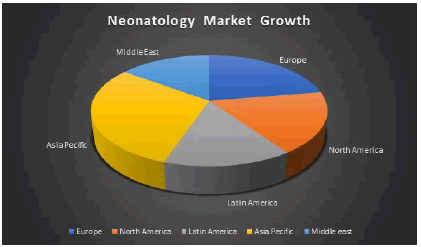
Global Neonatal (Preterm) Infant Care Market By Prenatal and Fetal Equipment (Ultrasound and Ultrasonography Devices, Fetal Doppler’s, Fetal Magnetic Resonance Imaging (MRI), Fetal Monitors), Neonatal Equipment (Infant Warmers & Incubators, Phototherapy Equipment, Neonatal Monitoring Devices and Respiratory Assistance & Monitoring Devices), , Product (Delivery Systems, Bili Lights, Respiratory Assistance Devices, Thermal Control Equipment’s, Monitoring Devices, Diagnostic Equipment, Pre Term Infant Formula), Product (Thermoregulation Devices, Monitoring Systems, Hearing Screening Devices And Vision Screening Equipment), End Users (Hospitals, Pediatric and Neonatal Clinics, Nursing Homes), Geography (North America, South America, Europe, Asia-Pacific, Middle East & Africa) - Industry Trends and Forecast to 2026.
The Global Neonatal Intensive Care Unit (NICU) Market is expected to be valued at $9. Billion by 2026; with CAGR of 5.9% from 2019 to 2026. Frequent prevalence of chronic diseases around the world & increase in the prenatal rate expected to boost the market in the coming years. Neonatal Intensive Care Unit (NICU) is a Special Unit in the hospital to take care of the premature birth of babies. The European countries followed by the North American Countries dominate the market in Neonatal Intensive Care Units (NICU). The growing birthrate in the developing countries & major investments by their governments in healthcare boost the market during the forecast years. However, the high initial cost may hamper the market in African countries. But overall rising awareness about the childcare across the world, entry of health insurance companies & emergence of private sector in new born intensive care units also boost the market.
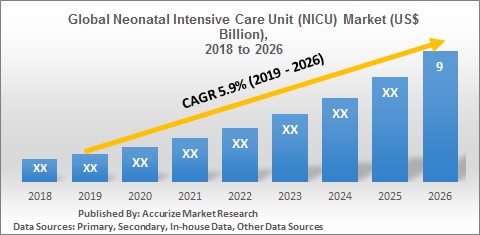
Thanks to all of our wonderful speakers, Conference attendees and Exhibitors for making this event a great success. We hope you had a remarkable time there and you all will keep good memories of our conference
29th Neonatology and Primary Care Congress was held during December 02-03, 2019 at Paris, France. The conference was marked with the attendance of Editorial Board Members of supported Journal of Neonatal and Pediatric Medicine, Scientists, young and brilliant researchers, business delegates and talented student communities representing more than 25 countries, who made this conference fruitful and productive.
This conference was based on the theme “Promulgating advancements in Neonatal Care and Medicine” which included the following scientific tracks:
- Neonatology
- Neonatal Nutrition
- Neonatal Food Allergy
- Vaccination and Immunization
- Neonatal Neurology
- Neonatal Anesthesiology
- Neonatal Cardiomyopathy
- Perinatology
- Neonatal Genetics
- Neonatal Obesity
- Neonatal Rheumatology
- Neonatal Diabetes
- Neonatal Care
- Neonatal Surgery
- Neonatal Cardiology
- Neonatal Gastroenterology
- Neonatal Hypertension
- Neonatal Endocrinology
- Neonatal Dermatology
- Neonatal Hematology
- Autism/ADHD
Euro Neonatology 2019 was moderated by Dr. Nannapaneni Meghana (KIMS Institute of Medical Sciences and Research Centre, India ) on Day-1and Day-2.
We are thankful to our below Honourable guests for their generous support and suggestions:
Dr. Said Moustafa M Eldeib, NMC Health Care Group, UAE
Dr. Vandana Tiwari, Dr. Ram Manohar Lohia Institute of Medical Sciences, India
Neonatology Meetings has taken the privilege of felicitating Euro Neonatology 2019 Organizing Committee, Editorial Board Members and Keynote Speakers who supported for the success of this event.
The esteemed guests, Keynote speakers, well-known researchers and delegates shared their innovative research and vast experience through their fabulous presentations at the podium of grand 29th Neonatology and Primary Care Congress was held during December 02-03, 2019 at Paris, France. We are glad to inform that all accepted abstracts for the conference have been published in Journal of Neonatal and Pediatric Medicine, as a special issue.
We are also obliged to various delegate experts, company representatives and other eminent personalities who supported the conference by facilitating active discussion forums. We sincerely thank the Organizing Committee Members for their gracious presence, support, and assistance. With the unique feedback from the conference, Neonatology Meetings would like to announce the commencement of the 30th Neonatology and Primary Care Congress on October 28-29, 2020 Webinar
Mark your calendars for the upcoming Conference; we are hoping to see you soon!
Let us meet again @ EURO NEONATOLOGY 2020
For More details contact: neonatologymeeting@europemeet.com
Conference Highlights
- Neonatology
- Neonatal Nutrition
- Vaccination and Immunization
- Perinatology
- Neonatal Neurology
- Neonatal Genetics
- Neonatal Intensive Care Units (NICU’s)
- Neonatal Cardiology
- Neonatal Gastroenterology
- Neonatal Endocrinology
- Neonatal Surgery
- Neonatal Rheumatology
- Neonatal Nursing
- Congenital Malformations & Birth Complications
- Neonatal Oncology
- Neonatal Cancer
- Neonatal Diseases & Disorders
To share your views and research, please click here to register for the Conference.
To Collaborate Scientific Professionals around the World
| Conference Date | October 28-29, 2020 | ||
| Sponsors & Exhibitors |
|
||
| Speaker Opportunity Closed | Day 1 | ||
| Poster Opportunity Closed | Click Here to View | ||
Useful Links
Special Issues
All accepted abstracts will be published in respective Our International Journals.
Abstracts will be provided with Digital Object Identifier by

